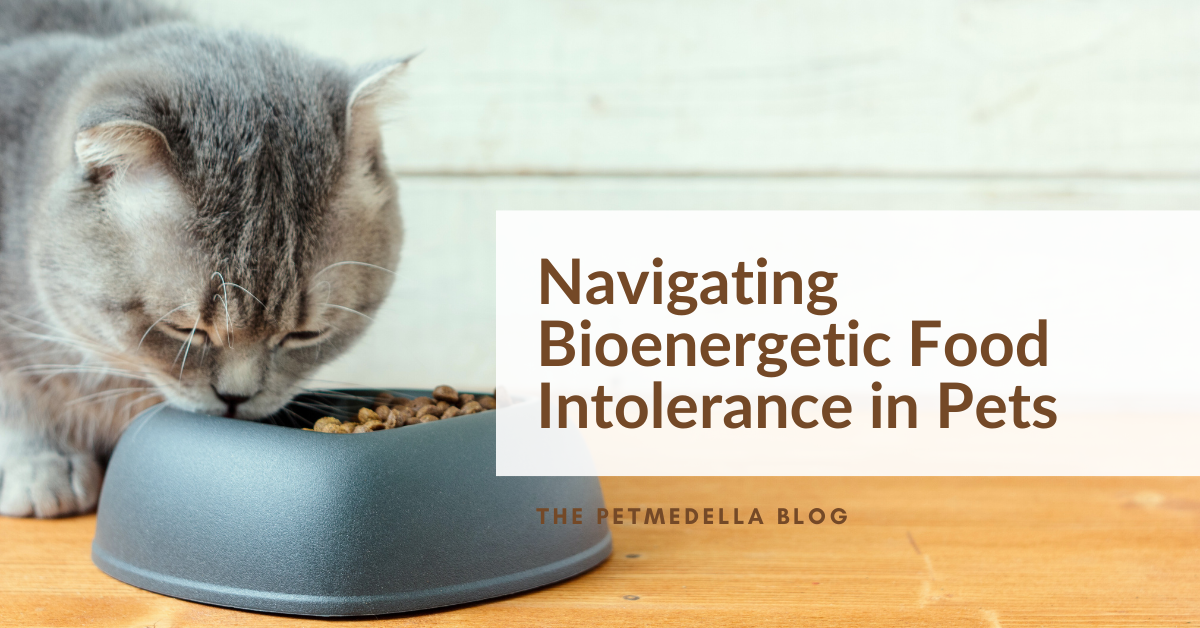
What does Bioenergetic Food Intolerance in Pets Look Like?
Just like people, food intolerance in pets exists as well. And like humans, the responses can range from itchy and irritating to even worse!
Understanding and managing your pet’s energetic food intolerances or sensitivities doesn’t have to be stressful. Keep reading! We’ll explore bioenergetic testing to identify and effectively address food sensitivities for pets, all from an energetic perspective.
What Are Food Sensitivities?
A food sensitivity, or food intolerance, is a reaction in your pet’s digestive tract when the system cannot break down or process a particular food or its ingredients. It differs from an allergic reaction, which involves the Immune System.
A true sensitivity or intolerance is rarely life-threatening but can make your pet very ill.
Common food sensitivity symptoms can manifest as digestive issues, skin problems, and overall discomfort.
On a bioenergetic report, there can be links between energetic sensitivities and things like Ear Drainage. Yes, Ear Drainage! This is a bioenergetic testing point that relates to stress in the ear area. Pets with food sensitivities may have itchy ears.
We always want you to rule out other culprits when it comes to itchy ears, such as bacterial or yeast infections, along with mites and fleas. If itchy ears persist, after exploring the above causes, it might be a food sensitivity.
If any of your pet’s symptoms continue for more than a day, or if your pet refuses to eat or drink, it may need veterinary attention. We always want you to seek help from a licensed veterinarian if you suspect a health issue in your pet!
Pets can quickly become dehydrated.
5 Most Common Sensitivities or Food Intolerances in Pets
These are the top 5 common energetic sensitivities we see in our PetMedella Sensitivity Scans. The significance of these can have nuanced interpretations with bioenergetic testing.
Grains: Wheat, corn, and other grains are common sources of allergies in pets. Grains are often used as fillers in commercial pet foods and can cause digestive issues and skin irritations in sensitive animals.
Dairy: Many pets, especially cats, are lactose intolerant, meaning they have difficulty digesting lactose, the sugar found in milk. This can lead to gastrointestinal upset, including diarrhea and vomiting.
Meat Proteins: While less common than grains and dairy, some pets can develop sensitivities to specific meat proteins, such as chicken, beef, or fish. These sensitivities can manifest as skin problems, digestive issues, or even respiratory problems. This is why many pet nutritionists recommend rotating proteins in your pet’s diet.
Eggs: Pets with egg sensitivities can experience itching, skin inflammation, gastrointestinal upset, and even respiratory issues.
Soy: Some pets may develop sensitivities to soy proteins, which can lead to digestive problems or skin issues. Soy is a common ingredient in many pet foods, especially vegetarian or vegan formulations.
When you submit your pet’s hair and saliva samples for bioenergetic testing with a Full Scan or Sensitivity Scan, the samples are being tested energetically for 350 resonating substances, including foods, environmental factors, and additives.
These sensitivities may reveal themselves because:
- Your pet’s Digestive System may be stressed.
- There may be stress in their Nervous System .
- Energetic toxins like mold or parasites may be present.
If you find that many different foods or environmental items are resonating as sensitive for your pet, don’t despair! By addressing system stress and supporting your pet through diet and lifestyle tweaks, you can see these energetic sensitivities diminish!
Identifying Signs of Food Sensitivities For Your Pet
Pets can’t communicate their discomfort in words, but they often show signs of food sensitivities through their behavior and physical health. Look out for symptoms such as:
- Digestive issues like vomiting, diarrhea, or constipation.
- Itchy skin, rashes, or hot spots.
- Lethargy or low energy levels.
- Joint pain or stiffness.
- Changes in mood or behavior.
Addressing Food Sensitivities Holistically
While eliminating trigger foods is a crucial step in managing food sensitivities, it’s essential to take a holistic approach to your pet’s health. Consider factors beyond just diet, such as:
- Parasites and histamine levels: Parasites can contribute to inflammation and digestive issues, while histamine imbalances can exacerbate allergic reactions.
- Gut health: A healthy gut is vital for proper digestion and nutrient absorption. Support your pet’s gut with probiotics, prebiotics, fresh food, bone broth and digestive enzymes.
- Environmental factors: Your pet’s surroundings can also impact their health. Minimize exposure to toxins and allergens in your home environment. This includes wiping your pet when they come in from a walk.
- Stress management: Stress can weaken your pet’s immune system and exacerbate food sensitivities. Provide a calm and stable environment for your furry friend.
Navigating Food Sensitivities with Dietary Adjustments
Once you’ve identified your pet’s sensitivities through bioenergetic testing or observation, explore making dietary adjustments to alleviate their symptoms. This may include:
- Switching to a hypoallergenic or limited ingredient diet that eliminates common allergens.
- Adding in species appropriate fresh foods, where applicable to your pet. This may look like bone broth, fermented goat milk, pumpkin or other squash, and even greens!
- Gradually introduce these new foods and monitoring your pet’s reaction.
- Support your pet’s digestive system through probiotics.
- Consulting with a PetMedella practitioner for further recommendations and to dig into the deeper connections between your pet’s energetic sensitivities.
Remember that every pet is unique, and finding the right approach to managing their food sensitivities may require some trial and error. This also takes patience, as it takes time for inflammation in the body, and the digestive system to calm down. Navigating food sensitivities in pets can be complex. Bioenergetic testing can help look at stress in your pet, and even suggest gentle homeopathic remedies to help with the gut, toxins, and other body systems.
